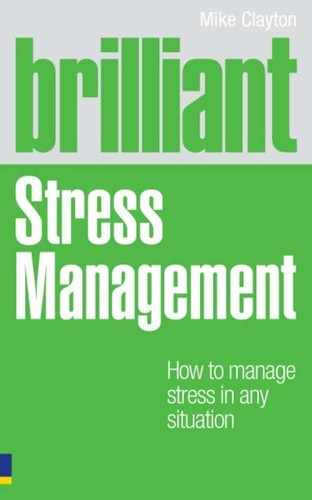Control your physical response to stress 45
water your rst priority when you feel peckish between meals,
have a headache or feel fuzzy-headed, or in any way lethargic.
A word or two about drugs – the legal ones
Most of us would like to think that we can control our stress
levels without the benet of drugs like sleeping pills, tranquil-
lisers, anti-depressants or illegal narcotics. But how many of us
are truly drug-free? Three legal drugs are widely used, yet each
can do us signicant harm when abused:
Caffeine
The least harmful of the three, caffeine can, nonetheless, exacer-
bate the problems you face when you are stressed.
Nicotine
The harm from nicotine is well documented and its use in the
Western world is declining. Yet many turn to nicotine at times of
stress, and smokers typically increase their intake.
Alcohol
Alcohol’s potential for harm is huge, from addiction to alcohol-
induced accidents. Yet it can also be used safely and, in small
doses, can help alleviate some of the symptoms of stress and help
promote relaxation and laughter.
We will examine these legal drugs one at a time.
Caffeine
Caffeine is a stimulant with similar physiological effects to
adrenaline and, in small quantities, will do you no harm: your
liver can deal with it and clear it from your system. But make no
mistake: large doses of caffeine are toxic.
Too much caffeine can cause heart palpitations and it is also
a diuretic, causing your kidneys to excrete more water than
46 brilliant stress management
normal, placing you at risk of dehydration. It reduces calcium
levels in your body, affecting bone growth and maintenance
and, in pregnant women, high doses are implicated in low-
birthweight babies.
How much caffeine is too much?
Caffeine is toxic in doses of over 300 milligrams (300 mg). This
is equivalent to three mugs of instant coffee or two of brewed
coffee, six cups of tea or four mugs of strong tea, eight cans of
cola or four of high-caffeine ‘energy’ drinks. The most startling
effect is how long it takes your body to clear caffeine. After
around ve hours, half of what you drank will still be in your
system, keeping you buzzing.
While one cup from time to time can enhance your cognitive
performance and memory, when you drink too much for a
period of time you will be less able to concentrate, make more
mistakes and nd the quality of your sleep is impaired. If you
recognise these symptoms, it is time to detox: stop drinking
caffeine. You will probably get a severe withdrawal headache
around 24 hours after your last drink, but the next day you will
feel much better. Replace the caffeine with herb or fruit teas,
or decaffeinated products, and drink caffeine-containing drinks
now and then, as a treat.
Nicotine
Why do smokers smoke when they are stressed? Because when
they do, they breathe deeply – which their body associates with
relaxation and so they relax. So, when you feel stress, make a
conscious effort to breathe deeply. In fact, nicotine itself is a
stressor – it activates your sympathetic (ght and ight) nervous
system, increasing your breathing rate, heart rate and blood
pressure.
The US Center for Disease Control (CDC) estimates that, for
every minute you smoke, your life expectancy drops by one
Control your physical response to stress 47
minute. So for a typical 20 cigarettes a day, that could be more
than 2 hours. That’s a month of your life, for every year of
smoking. This effect gets greater as you age, so a lifelong smoker
can easily lose a decade of living. But you will look older when
you die.
You will nd lots of advice for giving up smoking, and the
impact of doing so is pretty quick. Within 24 hours, your blood
oxygen (good) level comes back up to normal and your blood
carbon monoxide (bad) level drops back to near zero. Your lungs
have started to clear the soot, ash and old mucus, your clean
clothes smell fresh, and you have saved over £6. A month later,
you are £200 better off, have no nicotine in your body, you can
breathe better, and food tastes and smells wonderful – as will
your house, if you have cleaned and aired it. Most important,
your blood circulation is starting to improve already.
After a year, your breathing is noticeably better and you have
reduced the risk of a heart attack to half that of a smoker. Think
what you can do with the £2,500 you have saved. Ten years later
you can buy a new car and enjoy it, knowing that your chances
of getting lung cancer have reduced by 50 per cent.
Alcohol
One or two drinks, within safe limits, when you don’t need to
think carefully or operate machinery, are a good way to relax.
But a little social drinking is the tip of a big iceberg for some.
Who would really sign up for memory loss, poor judgement,
dehydration, headaches and dizziness? And these are just the
short-term effects. Long-term overuse of alcohol can increase
your susceptibility to heart disease, strokes, cancers (mouth,
throat, breast, liver and colon), liver and pancreatic diseases,
stomach problems, infertility and impotence, and osteoporosis
(brittle bones). And these are completely separate from the
social and emotional effects of alcohol abuse.
..................Content has been hidden....................
You can't read the all page of ebook, please click here login for view all page.
